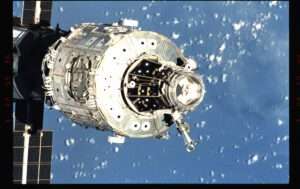In a pioneering effort to delve into the realm of heat management and explore astronauts’ capacity to maintain optimal temperatures in space, a groundbreaking experiment has reached the International Space Station (ISS). The initiative, which aims to uncover crucial insights into thermal regulation in microgravity environments, marks a significant step forward in understanding the challenges of human space exploration.

Keeping things cool in space is a major challenge for astronauts. The lack of atmosphere means that there is no natural convection to help cool things down, and the sun’s rays can heat up equipment to dangerous temperatures. A new experiment that has arrived at the International Space Station (ISS) is testing new ways to boil water in space, which could help astronauts stay cool and hydrated.
- The Experiment’s Objective
The core objective of this ambitious experiment, recently delivered to the ISS, is to examine how well astronauts can manage and regulate temperatures in the unique microgravity conditions of space. In an environment where traditional heat convection is virtually absent, scientists are eager to unravel the intricacies of heat dissipation, which could have far-reaching implications for the design of future spacecraft and prolonged space missions.
- Diving into the Details
At the heart of the experiment lies an array of advanced thermal management technologies and sensors. These innovative tools will monitor and record the temperature fluctuations around the astronauts as they go about their daily activities aboard the ISS. By capturing real-time data, scientists hope to gain insights into the effectiveness of heat-emitting devices worn by the astronauts and the overall heat exchange processes in a microgravity environment.
- Significance for Long-Duration Spaceflights
The findings from this experiment hold significant implications for the feasibility of extended spaceflights, such as missions to Mars or beyond. In the absence of Earth’s natural heat conduction mechanisms, ensuring the well-being and performance of astronauts becomes a critical challenge. Understanding how heat accumulates and identifying effective methods of dissipation could contribute to the development of more efficient cooling systems and help mitigate potential health risks associated with excessive heat.
- Collaborative Endeavor
This pioneering experiment is a result of collaborative efforts between multiple space agencies, research institutions, and technology partners. The seamless integration of cutting-edge technologies and scientific expertise underscores the collaborative spirit of the global space community. By pooling resources and knowledge, researchers aim to unlock the mysteries of heat management and advance our understanding of human adaptability in space.
- Future Implications
The success of this experiment could pave the way for improved heat management solutions on the ISS and other spacecraft, ultimately enhancing the safety and comfort of astronauts during their missions. Additionally, the insights gained from this study could inform the design of space habitats, spacecraft interiors, and astronaut attire, all contributing to the overarching goal of making space exploration more sustainable and viable for the future.

The experiment will test two different methods of boiling water in space:
- Electrode boiling: This method uses electrodes to heat up the water. The electrodes are inserted into the water, and an electric current is passed through them. This causes the water to heat up and boil.
- Microgravity Marangoni convection: This method uses the Marangoni effect to heat up the water. The Marangoni effect is a phenomenon that occurs when there is a difference in surface tension between two fluids. In this case, the water will be heated on one side, and the cooler water will flow to the heated side. This will cause the water to boil.

As the experiment commences its journey aboard the ISS, anticipation and excitement ripple through the scientific community. The quest to unravel the complexities of heat management in microgravity settings has the potential to redefine the boundaries of human space exploration. The BESS experiment is a important step in the quest to find new ways to keep astronauts cool in space. The data from BESS could have a major impact on future space exploration, and it could help astronauts stay safe and healthy for longer periods of time. With each data point collected, humanity edges closer to the stars, armed with the knowledge needed to conquer the challenges of space and embark on daring journeys into the unknown.
